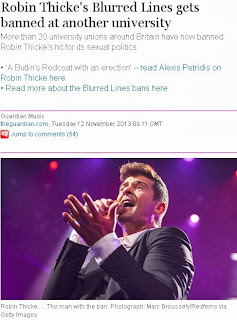 More news of Robin Thicke's now notorious (but big-selling) Blurred Lines being banned by over 20 UK universities, it being seen to fall foul of anti-rape/sexual abuse policies.
More news of Robin Thicke's now notorious (but big-selling) Blurred Lines being banned by over 20 UK universities, it being seen to fall foul of anti-rape/sexual abuse policies.Thicke has made some wildly divergent statements on the track and accompanying controversy, appearing to welcome and revel in it at times, and declaring himself a proud old-school sexist ... but at other points he's struck a very different note:
Thicke has defended the song, telling one interviewer: "If you listen to the lyrics, it says 'That man is not your maker' – it's actually a feminist movement within itself."Is Robin Thicke a feminist?!
In October, he told Radio 1 the song had been misunderstood. "I don't think people got it out here [in the UK] in those positions of power," he told Newsbeat. "I think the kids get it … I just have to deal with that."
Perhaps a more interesting question: to what extent should we differentiate between the likes of Wrecking Ball (or Miley Cyrus' on-stage twerking) and Blurred Lines? Is Sinead O'Connor's contention that many young female performers lose authorship of their work, becoming mere puppets for male managers and record executives, a valid one? Is a model sexually posed/objectified in a male artist's video in any regard inferior or superior to a female artist doing likewise in her own video?
No comments:
Post a Comment